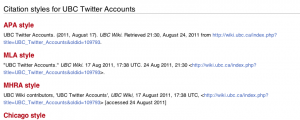 We’ve added a new extension on the UBC Wiki which creates citations in a variety of different formats for any page.
We’ve added a new extension on the UBC Wiki which creates citations in a variety of different formats for any page.
To use it, look for a new link called “Cite this page” under the toolbox in the left-side column. Clicking on the link will take you to a Special:Cite page which automatically generates citations for the page in a variety of formats. You can then copy a formatted citation and paste it where ever you like (into a paper, report, citation management software, etc).
Here’s an example of it in action for the UBC Twitter Accounts Page. One interesting thing to note is that the hyperlinks in the citations do not go directly to the live page, but instead point to the “current revision” from the page history. Thus, when people follow the link in your citation, they’ll see same version of the article as you saw it when you cited it.